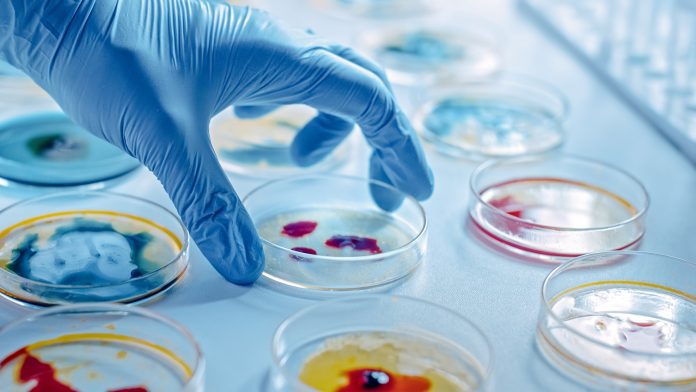
Jonathan Pearce, CEO of Antibiotic Research UK discusses the charity’s efforts in creating new therapeutics to tackle antibiotic-resistant infections, and the actions needed to better address the threat of AMR.
Interventions to mitigate the increasing threat of antimicrobial resistance around the world are urgently needed. Yet, there has been a worrying dichotomy between the devasting impact multi-drug resistance poses to public health and a lack of momentum from pharmaceutical companies to develop new antibiotics due to poor financial incentives. While this is slowly starting to change, the development of new treatments is only one piece of the puzzle. Tackling antibiotic resistance requires a multidisciplinary approach as well as improvements to public education regarding bacteria and the use of antibiotics. To discuss this in more detail, Lorna Rothery spoke to Jonathan Pearce, CEO of Antibiotic Research UK.
How did Antibiotic Research UK come to be formed?
The need to form a charity committed to tackling the growing global health emergency of antibiotic resistance was first raised during a 2014 meeting of Antibiotic Discovery UK, an organisation founded and chaired by Professor Anthony Milnes Coates to connect leading researchers and clinicians with an interest in antibiotic resistance. Antibiotic Research UK was formed shortly after and, after registering with the Charity Commission in July 2014, became the world’s first charity dedicated to fighting antibiotic resistance through a combination of research, patient support and education.
It was formed by academic and pharmaceutical scientists and clinicians with an active interest in antibiotic resistance, led by Professor Colin Garner. This group acknowledged that the area was underfunded and lacked the high profile of other disease areas such as cancer and heart disease. Yet without effective antibiotics, much of modern medicine would become risky – if not impossible. Unlike charities that have been created by patients or relatives of patients, our charity was formed by knowledgeable health professionals. The charity’s efforts were initially focused on finding new antibiotic treatments, leading to several peer-reviewed publications. Over time it became clear that while research can deliver results in the medium to long term, there was an immediate need to provide support to people with antibiotic-resistant infections. A Patient Support Service commenced in 2019 with one Patient Support Officer, a service which has continued to grow ever since.
Since its founding, Antibiotic Resistance UK has raised over £2 million to fight drug-resistant infections. Although a lot has changed since 2014, Antibiotic Research UK is still the only charity in the UK to focus on overcoming drug-resistant infections through research and to offer support for patients suffering from drug-resistant infections.
Part of your mission is to bring at least one new antibiotic treatment to market by the early 2020s, are you on track to achieve this goal?
We have made significant progress towards this goal. Antibiotic resistance breakers (ARBs) are drugs that, when combined with current antibiotics, can overcome bacterial resistance. We have screened over 1,200 existing drugs against multidrug-resistant Gram-negative bacteria, focusing on the four strains of bacteria that account for around 50% of major hospital-acquired infections. Our initial results found ten existing drug molecules that demonstrated ARB activity.
Beta-(β-) lactamase inhibitors can be used alongside β-lactam antibiotics to prevent β-lactamase enzymes from breaking down the antibiotics. By using sensitivity test discs seeded with antibiotic-resistant hospital isolates from the Queen Mary University of London, we found one combination, cefepime and sulbactam, that provided promising results against multidrug-resistant Gram-negative bacteria. Based on these findings, the charity commissioned the development of a test disc sensitivity kit to carry out further evaluations in hospital microbiology laboratories around the UK.
Our research shows there is potential for treating Acinetobacter baumanniii which is classified as a top-priority pathogen by the World Health Organization (WHO) because of its widespread resistance to all classes of antibiotics. Scientists working on this project told us recently that they have been contacted about a patient with a serious Acinetobacter baumanniii infection which was resistant to all available treatments. The only treatment which has shown any activity is our cefepime/sulbactam combination. We see great potential for this combination in developing countries in particular, we also wish to look at its potential for replacing other, existing drugs, such as those currently used to treat ESBL (E-coli-resistant) urinary tract infections (UTIs), however, we need to find partners to help us carry out clinical trials to bring the combination to market.
Can you outline the main economic, regulatory, and societal factors behind the decline in antibiotic drug discovery and development in recent years?
Declining private investment and lack of innovation in the development of new antibiotics are undermining efforts to combat drug-resistant infections, according to the WHO. It has also highlighted a weak development pipeline for antibiotic agents. According to recent WHO reports there are 60 products in development (50 antibiotics and ten biologics) that bring little benefit over existing treatments and very few target the most critical resistant bacteria (Gram-negative bacteria). While there are pre-clinical candidates (those in early-stage testing) in development and which are more innovative, it will take years before they reach patients.
WHO, in its reports ‘Antibacterial agents in clinical development – an analysis of the antibacterial clinical development pipeline’ and its companion publication, ‘Antibacterial agents in preclinical development’, concluded that research and development for antibiotics are primarily driven by small- or medium-sized enterprises with large pharmaceutical companies continuing to exit the field.
Behind this, the fact that no new classes of antibiotics have been discovered since the 1980s is driven by what is in effect a broken market, with the current economic model not working. Commercial companies have to invest large sums of money over long periods to bring new drugs to market, but with antibiotics, it is hard for them to recover their costs or make a profit. This is because when you develop a new antibiotic, it needs to be affordable (compared to other higher priced drugs and therapies that may be developed) and also be well-managed in terms of its use, so that it is not over-prescribed and so risks losing its medical effectiveness (from the development of resistance to it). This mix of lower revenues and reduced use limits the profit that commercial companies can make from antibiotic development. The majority of current research in the antibiotic field is carried out in small biotech companies, although there are now some national and international funding initiatives that have started to emerge to address this issue, as well as the testing of different types of payment systems for antibiotics, such as the subscription-pricing model being piloted in the UK.
Ultimately, there is likely to be a need for much more national and international government involvement in investment and funding models to drive the research and development that is required to tackle antibiotic resistance and to ensure that we have a sustainable approach.

The UK Government launched its five-year national action plan in 2019 and set out its vision for AMR to be contained and controlled by 2040; do you feel enough is being done at a policy level to tackle AMR and support the development of new antimicrobials?
Antibiotic Research UK responded in January 2023 to the UK Government’s call for evidence on its review of the current National AMR Action Plan. We highlighted several important issues for the new plan, including the need for:
- A higher level of priority for fast, accurate, point-of-care diagnostics;
- Better monitoring, surveillance, and follow-up care for those affected by an AMR infection, including patient experience data, and inclusion of AMR as a cause of death on death certificates – all as part of the development of an AMR registry;
- An end to the practice of water companies discharging raw sewage into our waterways, which directly leads to increased AMR. In the meantime, before this happens there should be formal monitoring of antimicrobials in water at a national level, including a map of AMR in waterways and surface water to link this to human epidemiology, to see whether this correlates. Keeping people, their water supplies and sewage separate is one of the greatest health innovations of the modern world and we seem to have forgotten this in the UK;
- Better public awareness of AMR and the appropriate use of antimicrobials, focusing on behavioural psychology and ensuring people are equipped and supported to do the right thing with antibiotics (including clinicians, patients, and the public), including an increased focus on appropriate disposal of unused antibiotics, better allergy labels and testing; and
- To train the next generation of researchers, given the difficulty for scientists and academics to develop a career in the field of antibiotic resistance.
How would you describe public knowledge, attitudes, and practices surrounding antibiotic use in the UK? What interventions are needed to increase awareness?
Awareness varies, but overall, there needs to be a significant increase in the understanding and awareness of antibiotic resistance. At Antibiotic Research UK, we believe it is important to improve and develop and understanding of antibiotic or antimicrobial use. There is a great deal of complexity associated with what this concept of ‘use’ really means and with the psychology involved with changing behaviours and understanding in this vitally important area of public health. We should start moving towards stating the issue as something like ‘inappropriate antibiotic or antimicrobial use.’ Simple and repeated exhortations about what to do, or not to do, do not work and we need to use different models or develop new ones to change public behaviour. For example, see the COM-B model as one approach, which involves capability (C), opportunity (O), and motivation (M) as three key factors capable of changing behaviour (B). There is a need to make sure this accounts for ‘people’s behaviours’ in relation to antibiotic use. This ranges from clinicians’ and vets’ prescribing, review, and administration of antimicrobials – through to patient and public awareness and behaviours (including course length, keeping-and-sharing, and inappropriate disposal). At Antibiotic Research UK, we see elements of this in our public engagement and public support work, where there are common misunderstandings or lack of knowledge about infections, infection prevention and management, appropriate use of antibiotics and antimicrobial resistance itself.
Can lessons taken from the COVID-19 pandemic be applied to the ongoing effort to prevent drug-resistant infections?
Yes, there are lots of lessons we can learn from the COVID-19 pandemic, including the following:
- Involving and engaging the public and patients in AMR research. For instance, during the pandemic, we used apps and other tools to involve patients in research around COVID symptoms, diagnosis, disease, treatment etc.;
- We could do this with other infections – and link these into large adaptive platform trials to quickly identify what works and what does not. See ISARIC (https://isaric.org/) as an example of a collaborative platform focused on patient-based research in response to global infections/pandemics. A similar approach could be set up and developed by the UK government rather than leaving it to be done by others;
- Developing public awareness campaigns and public information on AMR, in the way that we did with COVID;
- Improved, longer-term patient support for people living with AMR infections; and
- Develop open collaborative cross-disciplinary challenge-led research initiatives, in the way
that worked within the pandemic to develop new vaccines.
Jonathan Pearce
CEO
Antibiotic Research UK
https://www.antibioticresearch.org.uk/
https://www.linkedin.com/company/antibiotic-research-uk/
https://www.facebook.com/AntibioticResearchUK
https://twitter.com/1Antruk
https://www.instagram.com/antibioticresearchuk/
https://www.youtube.com/channel/UCjHZjBWf0sPGoyNPfw3gKyw
This article is from issue 25 of Health Europa Quarterly. Click here to get your free subscription today.










